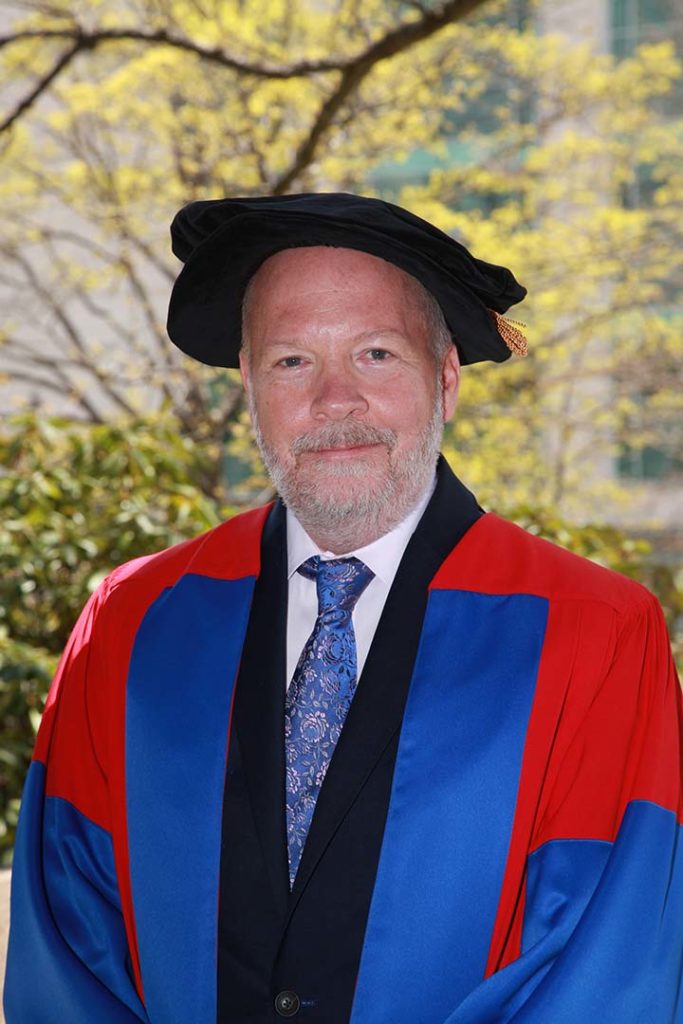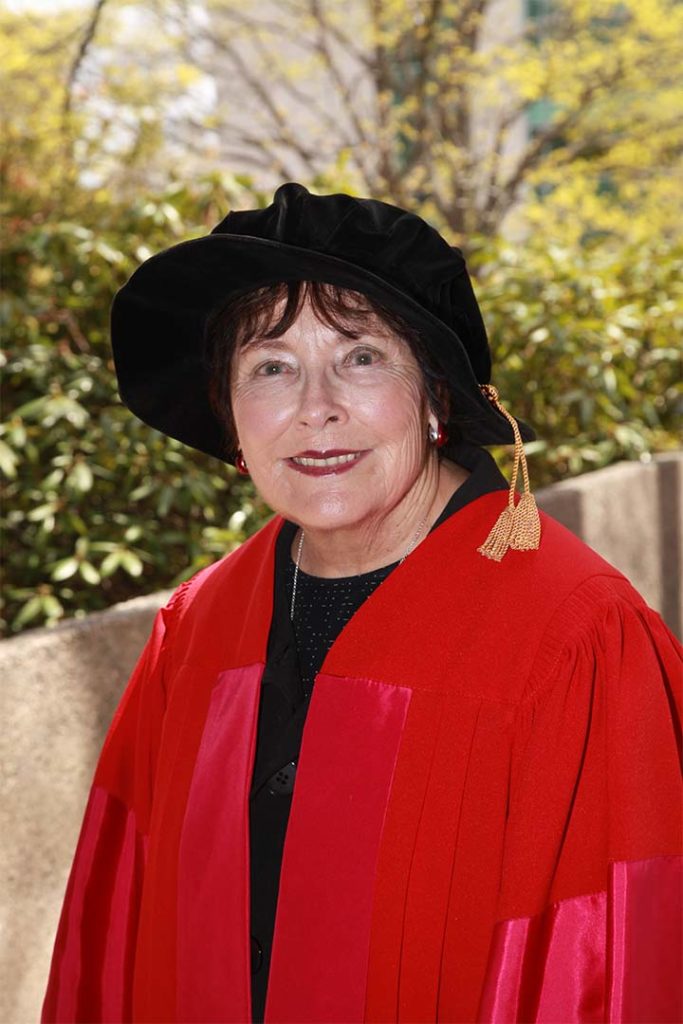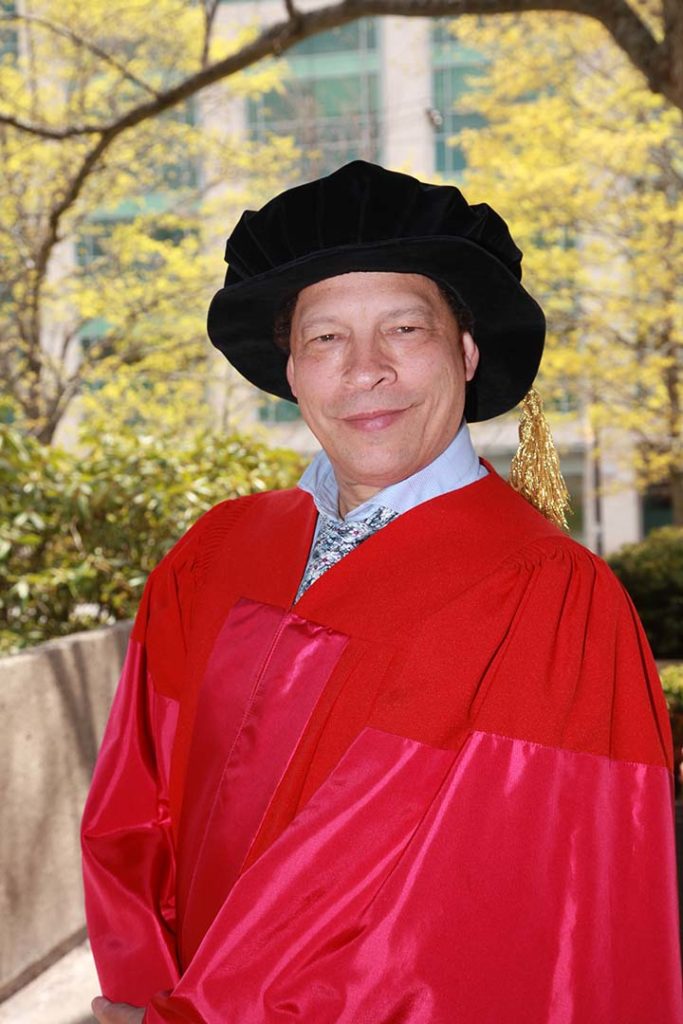Bruce Gordon
Domine Vice-Cancellari; praesento vobis Brussium Gordon ut admittatur ad gradum Doctoris in Jure Canonico (honoris causa).
 In an academic career that began in the King’s Foundation Year, Bruce Gordon has come to exemplify scholarship as a way of living collegially in the past and in the present. If his work to date has focused largely (though by no means exclusively) on the difficult and divisive figure of the Reformation theologian John Calvin, his efforts to understand both the thinker in his age and the thinker’s living ideas in our own reflect the highest goals of humanistic education: to bridge the fault lines that separate human beings in space and time by seeking to probe their perspectives with rigorous empathy, rather than dismissing them with momentary ideologies.
In an academic career that began in the King’s Foundation Year, Bruce Gordon has come to exemplify scholarship as a way of living collegially in the past and in the present. If his work to date has focused largely (though by no means exclusively) on the difficult and divisive figure of the Reformation theologian John Calvin, his efforts to understand both the thinker in his age and the thinker’s living ideas in our own reflect the highest goals of humanistic education: to bridge the fault lines that separate human beings in space and time by seeking to probe their perspectives with rigorous empathy, rather than dismissing them with momentary ideologies.
Professor Gordon’s scholarly habits and character were formed here at King’s and Dalhousie. After earning FYP’s highest grade of 1981, he pursued a degree in Medieval Studies, in 1984 taking the only medal ever offered for that degree. Still in the intellectual grip of the Medieval world, but already inclining toward the continental Reformation that would become his field of expertise, he completed an M.A. thesis in Classics on the German mystic Meister Eckhart in 1986. His research during these years was not his only contribution to the collegial life of scholars here. Many former student residents recall the warmth and care with which their beloved don countered the chill of North Pole Bay, hosting gatherings and supporting their studies. Bruce is still a friend to King’s students and faculty, and has come home on several occasions to address the Chapel Community as well as Foundation Year and Early Modern Studies audiences.
After leaving Halifax, Professor Gordon completed the PhD at the University of St. Andrews in Scotland, establishing himself as a leading scholar of the Swiss Reformation and of Calvin while serving as Lecturer, Reader, and then Professor of Modern History at the same university. In 2008, he was appointed to Yale University and the following year became Titus Street Professor of Ecclesiastical History—an appointment held by only the most distinguished historians in his field. His 10 authored and edited books include The Swiss Reformation, a Choice Magazine “Outstanding Publication” of 2003, a magisterial biography of Calvin in 2009, and his most recent book, 2016’s John Calvin’s Institutes of the Christian Religion: A Biography, which examines how one of the defining works of the Reformation was received from the 16th century to the age of YouTube—sometimes in improbable or unexpected ways. Prof. Gordon maintains a scholarly relationship with Switzerland, and continues working closely with the faculty and students of the Institute for Swiss Reformation History in Zurich. In 2012, he was awarded an honorary Doctor of Philosophy by the University of Zurich. Diagnosed with bipolar disorder after his time at King’s, Prof. Gordon is committed to increasing awareness of mental health. He is currently president of the New Haven affiliate of the National Alliance on Mental Illness.
In a recent interview Bruce Gordon said that there is wisdom for the present in the study of the past, but that we must be humble in unlocking it. “We must not,” he said, “practice the condescension of the present whereby we assume ourselves to have improved on that world.” Mr. Vice-Chancellor, for his humble service to scholarship in disclosing past wisdom for present cultivation, I ask you, in the name of King’s College, to bestow upon Professor Bruce Gordon the degree of Doctor of Canon Law (honoris causa).
Dale Godsoe
Domine Vice-Cancellari; praesento vobis Vallem Godsoe ut admittatur ad gradum Doctoris in Jure Civili (honoris causa).
 Dale Godsoe’s name evokes the long, broad alluvial valley—the ‘dale’— of countless gathering points of communal exchange through history. And Dale Godsoe’s long career of organizational leadership evokes her geographical namesake in turn, for it has gathered and channelled diverse individuals, parties and causes and held them together in a gentle, nurturing and fertile embrace, allowing a community of communities to develop and prosper.
Dale Godsoe’s name evokes the long, broad alluvial valley—the ‘dale’— of countless gathering points of communal exchange through history. And Dale Godsoe’s long career of organizational leadership evokes her geographical namesake in turn, for it has gathered and channelled diverse individuals, parties and causes and held them together in a gentle, nurturing and fertile embrace, allowing a community of communities to develop and prosper.
King’s has come to know and love Dale as a member of our Board of Governors from 2007, and its Chair from 2013 until 2018. But the kind of care she has shown King’s faculty, administration and students is cherished elsewhere too. The Symphony Nova Scotia Foundation is but one of numerous organizations to benefit from her chairship. To be sure, a concern for music and the creative arts is a motif that runs through Ms. Godsoe’s record: she has served on the boards of the National Arts Centre and Ballet Canada as well. Yet the symphony of her various causes and interests is not confined to the creative arts. She has orchestrated positive change by chairing Develop Nova Scotia (formerly the Waterfront Development Corporation), HRMby DESIGN, and the Halifax Regional and Centre Plans. She has set tempo in the charitable sector through board memberships and chairships at the Canadian Centre for Philanthropy, the United Way and the QEII Foundation. In media and communications, she has served Viacom, VisionTV, and Aliant. Not surprisingly, for one who earned both bachelor’s and master’s degrees in education and began her career as a teacher, the educational field has been a dominant theme across the movements of her working life: Dale has chaired the Halifax School Board, the Board of Mount Saint Vincent University, and served as Dalhousie’s External Vice-President from 1996-2006, before joining the Board at King’s. In all of her roles, Dale has taken special care to mentor and advise younger colleagues—and especially women—to achieve all they can. Her daughters Suzanne, Stacey and Laura bear particular witness to her good example. Like a wise symphonic conductor who rises above the melodic swell and yet remains passionately immersed in it, Dale helps divergent and even discordant voices to blend into rich harmonies of purpose.
Dale Godsoe has been duly recognised for her achievement by numerous awards, distinctions, and honorary degrees, including a Canada Volunteer award and, in 1998, the Order of Canada. In 2018, the King’s Alumni Association bestowed upon Ms. Godsoe the venerable Order of the Ancient Commoner. Mister Vice-Chancellor, here in the crescendo of her accolades, in recognition of her tireless, wise leadership in governance, as well as her unequivocal dedication to the interests of King’s and her community, I ask you to bestow upon Dale Godsoe the degree of Doctor of Civil Laws (honoris causa).
Lawrence Hill
Domine Vice-Cancellari; praesento vobis Laurentium Hill ut admittatur ad gradum Doctoris in Jure Civili (honoris causa).
 The author of ten books and countless essays, journalistic articles and editorials, Lawrence Hill is one of Canada’s best-known literary figures—and not simply on the page. His voice has come to readers with accustomed frequency via the national airwaves as well. To date he is the only novelist to be selected twice in the CBC Radio Canada Reads competitions, in 2009 for The Book of Negroes and in 2016 for The Illegals. On the same station, in 2013, he broadcast his five-part Massey lecture series, Blood: The Stuff of Life. In addition to documentary film and television productions, his name as a writer of timely historical fiction has reached huge international audiences through the award-winning six-episode TV miniseries adaption of the Book of Negroes. Among numerous recognitions for his work at home and abroad, Mr. Hill received the Commonwealth Writer’s Prize in 2008, and was named to the Order of Canada in 2015.
The author of ten books and countless essays, journalistic articles and editorials, Lawrence Hill is one of Canada’s best-known literary figures—and not simply on the page. His voice has come to readers with accustomed frequency via the national airwaves as well. To date he is the only novelist to be selected twice in the CBC Radio Canada Reads competitions, in 2009 for The Book of Negroes and in 2016 for The Illegals. On the same station, in 2013, he broadcast his five-part Massey lecture series, Blood: The Stuff of Life. In addition to documentary film and television productions, his name as a writer of timely historical fiction has reached huge international audiences through the award-winning six-episode TV miniseries adaption of the Book of Negroes. Among numerous recognitions for his work at home and abroad, Mr. Hill received the Commonwealth Writer’s Prize in 2008, and was named to the Order of Canada in 2015.
Blood as theme, metaphor, and ideology circulates through Mr. Hill’s diverse oeuvre, which often explores themes of racism, inequality, identity and belonging, as well as connections between people of the African Diaspora. At a time when the humanities and journalism are grappling with the ways oppression manifests in traditional scholarship and curricula and are seeking ways to better include and support students, Mr. Hill’s work goads self-critical reflection, dialogue, and action on issues that can divide us within our own communities and exclude others from them. Further, at a point when King’s engages in scholarly inquiry on our historical connections to slavery, The Book of Negroes serves as a particularly relevant touchstone. In telling the story of a girl’s abduction in Niger and enslavement in America, her escape to an inadequate freedom in Nova Scotia, and her final journey back to West Africa, Hill’s book does for us locally what the best historical fiction does universally, creating a crucial opportunity for readers to consider, debate, and to discuss what was, what could have been, what is, and what should be.
As his growing list of honorary degrees attests, Mr. Hill is no stranger to the campus, where he is recognized both for his inspiring writing, and his example of service to educational and social justice causes, including those of girls in developing areas of Africa and prison inmates in North America. He is Professor of Creative Writing at Guelph University, and has taken a direct interest in our academic community here at King’s. Not only does he share the graduand’s platform with his daughter, Evangeline Freedman, today! Last July he also provided a keynote speech—open to the public— on the topic of migration at Humanities for Young People, King’s live-in summer residency program for teens.
Mr. Vice-Chancellor, for his prolific and eloquent writing and teaching, including his vital role in charting the journeys of people of African descent through slavery and freedom in Nova Scotia and Canada, I ask you, in the name of King’s College, to confer upon Lawrence Hill the degree of Doctor of Civil Law (honoris causa).